| Srl | Item |
| 1 |
ID:
096501
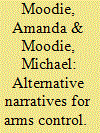

|
|
|
|
|
| Publication |
2010.
|
| Summary/Abstract |
The efforts of President Barack Obama and his administration to restore the United States as a driving force of multilateral arms control and nonproliferation negotiations are commendable, yet the lack of progress on such issues over the last eight years has ensured that U.S. policy has not kept pace with changes in the geostrategic environment and the evolving security agenda. Meanwhile, an alternative agenda has been articulated by non-Western countries. This article focuses on the arms control perspectives of Non-Aligned Movement states and others that have begun to embrace the idea of "disarmament as humanitarian action." It explores this idea in the context of recent initiatives and argues that if the Obama administration wants to make progress on its arms control and nonproliferation priorities, it should consider a multifaceted approach that incorporates this emerging alternative agenda.
|
|
|
|
|
|
|
|
|
|
|
|
|
|
|
|
| 2 |
ID:
108143
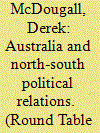

|
|
|
|
|
| Publication |
2011.
|
| Summary/Abstract |
North-South issues as such do not figure prominently in Australia's international policy but are mostly implicit. These issues arise particularly in the context of Australia's relations with countries in its immediate vicinity, including the South Pacific, Indonesia and East Timor. There are also some global issues in the North-South context where Australia is affected. Australian governments, in developing policies relating to this context, have been influenced by a 'practical realism' that puts first priority on Australian interests as perceived by governments at any given time. The way in which those policies have been developed, in both the regional and the global contexts, can be assessed through an examination of issues relating to security and international economic relations. Australia's alliance relationship has a strong bearing on the way Australia approaches the security issues. In relation to international economic issues there are many commonalities with fellow producers of raw materials in the Global South.
|
|
|
|
|
|
|
|
|
|
|
|
|
|
|
|
| 3 |
ID:
106754
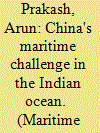

|
|
|
| 4 |
ID:
002926
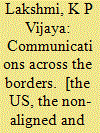

|
|
|
|
|
| Publication |
New Delhi, Radiant Publishers, 1993.
|
| Description |
xii, 202p.Hardbound
|
| Standard Number |
8170722041
|
|
|
|
|
|
|
|
|
|
|
|
Copies: C:1/I:0,R:0,Q:0
Circulation
| Accession# | Call# | Current Location | Status | Policy | Location |
| 034345 | 384/VIJ 034345 | Main | On Shelf | General | |
|
|
|
|
| 5 |
ID:
030636
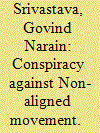

|
|
|
|
|
| Publication |
New Delhi, New Delhi Publications Private Limited, 1986.
|
| Description |
148p.
|
|
|
|
|
|
|
|
|
|
|
|
Copies: C:1/I:0,R:0,Q:0
Circulation
| Accession# | Call# | Current Location | Status | Policy | Location |
| 032060 | 327.116091716/SRI 032060 | Main | On Shelf | General | |
|
|
|
|
| 6 |
ID:
100242
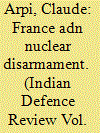

|
|
|
| 7 |
ID:
091476
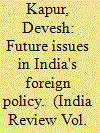

|
|
|
|
|
| Publication |
2009.
|
| Summary/Abstract |
The early decades of India's independence were characterized by a broad engagement in international affairs, with the country taking a leadership role in international organizations and regimes. This diplomatic internationalism contrasted starkly with India's autarchic economic policies, as the country became more economically insular in its first decades. The growing mismatch between India's ambitions to be a major actor in global affairs and its declining economic influence had become evident by the 1980s.
|
|
|
|
|
|
|
|
|
|
|
|
|
|
|
|
| 8 |
ID:
100001
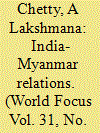

|
|
|
| 9 |
ID:
030726
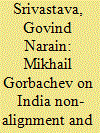

|
|
|
|
|
| Publication |
New Delhi, Indian Institute for Non-Aligned Studies, 1987.
|
| Description |
136p.Hbk
|
|
|
|
|
|
|
|
|
|
|
|
Copies: C:1/I:0,R:0,Q:0
Circulation
| Accession# | Call# | Current Location | Status | Policy | Location |
| 032062 | 923.1/SRI 032062 | Main | On Shelf | General | |
|
|
|
|
| 10 |
ID:
185288
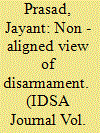

|
|
|
| 11 |
ID:
047309
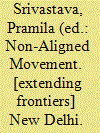

|
|
|
|
|
| Publication |
New Delhi, Kanishka Publishers, 2001.
|
| Description |
xv, 211p.
|
| Standard Number |
817391446X
|
|
|
|
|
|
|
|
|
|
|
|
Copies: C:1/I:0,R:0,Q:0
Circulation
| Accession# | Call# | Current Location | Status | Policy | Location |
| 044846 | 327.17/SRI 044846 | Main | On Shelf | General | |
|
|
|
|
| 12 |
ID:
146705
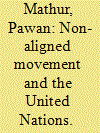

|
|
|
|
|
| Contents |
The demand for the reform of the United Nations Security Council (UNSC) is a longstanding one from the countries of the Global South. As the largest collective organisation representing these states, the Non-Aligned Movement has been the most vocal in demanding an improvement in the working of the UNSC. This article examines how the movement has reiterated its belief in making accountability, consistency and transparency the key elements of UNSC reform along with the demand for increasing regional representation in the council to overcome the existing democratic deficit.
|
|
|
|
|
|
|
|
|
|
|
|
|
|
|
|
| 13 |
ID:
123691
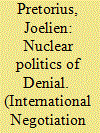

|
|
|
|
|
| Publication |
2013.
|
| Summary/Abstract |
AbstractSouth Africa was one of the first states to conclude an Additional Protocol with the International Atomic Energy Agency (IAEA) in 2002, allowing the IAEA greater right of access to safeguard nuclear activities and material. In light of this, some observers in the arms control community find it odd that South Africa's representatives at the Nuclear Suppliers Group (NSG) would be the main objectors to making the conclusion of an Additional Protocol a precondition for states wishing to import uranium enrichment and reprocessing technology (classified as sensitive nuclear technology and material). The South African objection should be viewed as only the most recent in a series of objections to measures that may seem obviously in line with nuclear non-proliferation. This emerging pattern in South Africa's nuclear diplomacy and, more specifically, the objection to the Additional Protocol condition are related to its membership in the Non-Aligned Movement (NAM) and can be investigated through the lens of a politics of denial. Denial is the act of saying "no", but it is also in psychological parlance the unconscious thought process manifesting a refusal to acknowledge the existence of certain unpleasant aspects of external reality. It will be argued that South Africa's opposition to the Additional Protocol condition can be explained in the context of two instances of denial: (i) a perceived denial by the nuclear haves of what the Nuclear Non-Proliferation Treaty codifies as an inalienable right to peaceful nuclear technology - something that South Africa is cautious to be complicit in; and (ii) the nuclear weapon states' denial (the psychological meaning) of the unpleasant reality of a hypocritical nuclear order - something that South Africa wants to expose or at least something with which to engage to limit the effects for itself and other NAM members. The politics of denial does not yield to a pragmatist/utopian dichotomy in the nuclear realm, but instead reveals the dialectic nature of realism and idealism in nuclear politics, especially as reflected in South Africa's nuclear diplomacy.
|
|
|
|
|
|
|
|
|
|
|
|
|
|
|
|
| 14 |
ID:
114432
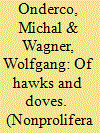

|
|
|
|
|
| Publication |
2012.
|
| Summary/Abstract |
The policies toward countries aspiring to acquire nuclear weapons continue to be heavily contested, differing even among countries that consider nuclear proliferation as one of the main threats to international security. This article maps the actual policies of liberal democracies toward Iran and North Korea along a continuum from confrontation to accommodation. Using data from an expert survey, the authors outline four main findings. First, policies toward both Iran and North Korea have become increasingly confrontational over time. Second, no policy convergence was observed among the states studied; that is, notwithstanding the adoption of joint sanctions, differences remained between states preferring confrontation and those opting for accommodation. Third, states maintained remarkably stable policy profiles over time. Finally, despite obvious differences between the norm violations of North Korea and Iran, states generally followed remarkably similar policies toward both countries. The authors' findings indicate that states exhibit stable preferences for either confrontation or accommodation toward nuclear aspirants. Although a comprehensive examination of the causes of these policy differences is beyond the scope of this article, the authors present evidence that a major cleavage exists between members and non-members of the Non-Aligned Movement, indicating that the degree to which nuclear aspirants' sovereignty should be respected is a main issue of contention.
|
|
|
|
|
|
|
|
|
|
|
|
|
|
|
|
| 15 |
ID:
029086
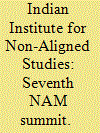

|
|
|
|
|
| Publication |
New Delhi, New Delhi Publications, 1984.
|
| Description |
174p.
|
|
|
|
|
|
|
|
|
|
|
|
Copies: C:1/I:0,R:0,Q:0
Circulation
| Accession# | Call# | Current Location | Status | Policy | Location |
| 025123 | 327.116091716/IND 025123 | Main | On Shelf | General | |
|
|
|
|
| 16 |
ID:
030536
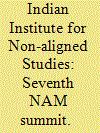

|
|
|
|
|
| Publication |
New Delhi, New Delhi Publications Private Limited, 1984.
|
| Description |
vii (174p.)
|
|
|
|
|
|
|
|
|
|
|
|
Copies: C:1/I:0,R:0,Q:0
Circulation
| Accession# | Call# | Current Location | Status | Policy | Location |
| 024548 | 327.116091716/IND 024548 | Main | On Shelf | General | |
|
|
|
|